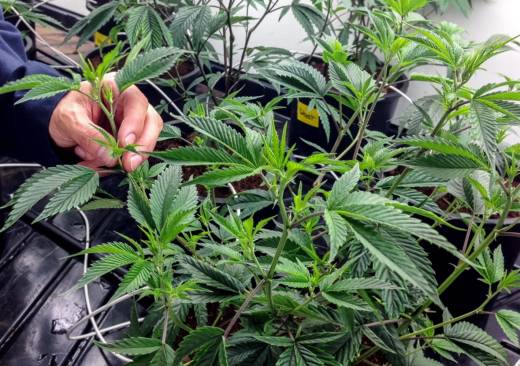"I don’t understand how we could even think for a minute that anyone convicted of any of these types of heinous felonies should be in the business with the city of Los Angeles," said O'Gara at Tuesday's hearing. "This is a business that the federal government still believes is a criminal activity."
A big part of L.A.’s pot regulation plan is a "social equity" component, an effort to encourage minority entrepreneurship in parts of the city that have historically had a disproportionately high number of non-felony pot arrests.
It's something not everyone might understand, said Donnie Anderson of South L.A.
“If you haven’t come from our communities ... you haven’t been oppressed by the people who sent people (with) nonviolent felonies (to jail)," said Anderson. "They should be allowed to own and operate in this industry. This is about people who continue to be hurt by the failed policies of the United States.”
The city forecasts upward of $100 million a year in tax revenue from the legal cannabis industry.
The proposed regulatory framework would allow for about 200 new licensed retailers. That’s on top of the roughly 200 already selling medical pot now. It also provides room for hundreds more "microbusiness" growers and sellers of boutique marijuana products like oils and edibles.
Kat Packer, of the recently formed L.A. Department of Cannabis Regulation, addressed worries over a large number of dispensaries currently operating under the radar without a license, or who may fail to comply with updated state and local rules that will kick in come January.
"And I know that the LAPD is in the process right now trying to put more officers on the street. If these folks aren’t willing to transition to a regulated framework, you have to shut down," said Packer.
Still up for debate are separate rules for how to regulate the imbibing of marijuana on the premises of a licensed seller. That will be taken up by the council at a later date.
Here are some additional highlights of the guidelines under consideration:
- Give priority licensing to existing medical marijuana dispensaries operating with a valid business tax registration certificate in compliance with the city’s limited immunity and tax rules.
- Establish "grandfather" provisions that allow existing medical marijuana dispensaries to continue operating in their current location.
- Prohibit individuals convicted of violating any state or local law involving violent crimes, sex trafficking, rape and other crimes from commercial cannabis activity for at least 10 years from the date of conviction.
- Require retailers to utilize electronic age verification to determine the age of any individual attempting to purchase cannabis goods.
- Prohibit marijuana businesses with on-site sales from operating within 800 feet of another cannabis retailer or from a school, public park or substance abuse recovery or treatment facility.
- Establish a 600-foot buffer from schools for all non-retail marijuana businesses, including non-retail delivery services.
- Dedicate a portion of the Community Reinvestment Fund to benefit youth programs in neighborhoods most impacted by prior cannabis regulations.
-
